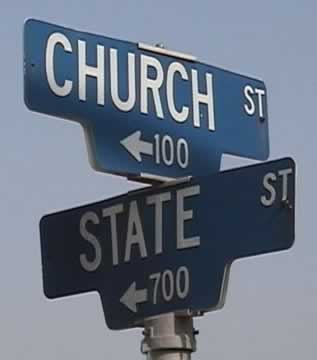 The city of Memphis, TN is currently going through a municipal election, and many organizations are endorsing a slate of candidates for office that best promotes their values. This includes the Bellevue Baptist Church. This endorsement by the church, however, is apparently illegal.
The city of Memphis, TN is currently going through a municipal election, and many organizations are endorsing a slate of candidates for office that best promotes their values. This includes the Bellevue Baptist Church. This endorsement by the church, however, is apparently illegal.On the website of the Bellevue Baptist church, there is a link to another website that endorses candidates that have “stood for strong family values.” The church’s website reads: “Please access the Family Action Council of Tennessee website (www.familyactiontn.org) and click on the Memphis City Council Elections for a list of those councilmen who have stood strong for our values on this issue and are being strongly opposed by the TEP Political Action Committee.” This church based opposition has stemmed from the Tennessee Equality Project’s (TEP) push to replace some of the anti-gay council members with more gay rights-friendly members.
Now, while the church may believe themselves to have found a loophole by not directly endorsing these candidates on their own website, the IRS has warned houses of worship about linking to campaign related sites. This would not have been a problem if they chose to link to a non-partisan site, or if they linked to the sites of all candidates running for office and encouraged their church members to do their own political research. But, because they linked to a site that specifically endorses certain candidates over others, they are in violation of the IRS’s regulations. According these regulations the church, a 501(C)(3) tax-exempt organization, is prohibited from intervening in politics while the Family Action Council of Tennessee (the group that runs the linked website), a 501(C)(4) organization, is allowed to participate in political discourse. This violation could cause the Bellevue Baptist church their tax-exempt status.
I wholeheartedly agree with the author and feel that the IRS should investigate these issues. The political intervention ban was proposed by Sen. Lyndon Johnson and passed by Congress in 1953. Over the years it has only gotten stronger. Most recently, in 1987, congress updated the language to clarify the prohibition of statements from these organizations opposing candidates. However, the law does not prohibit churches from participating in politics entirely. The IRS lays out ways that these types of organizations can promote civic engagement and political awareness, fore example linking to a non-partisan website, encouraging members to do their own political research, etc.
This regulation is a very good measure imposed by the IRS because it tries to keep church authority and governmental authority separate. However, similar to the child-benefit theory, if a church wishes to promote the overall societal good (heightened, unbiased political awareness, etc.) then the government allows for such engagement. The issue comes when a church tries to impose their political beliefs on their members. This problem seems to be an inverse of the incidence where a math teacher tried to display banners related God in his classroom. Whereas he was prohibited from using “his public position as a pulpit from which to preach his own views on the role of God,” the church, too, should be prohibited from using its religious position as a pulpit from which to preach its own views on the role of candidates in government. The separation of church and state is a two way street. If the government is not allowed to establish a religion, then the church should not be allowed to establish a government.

2 comments:
I agree with Mike that, based on the political intervention ban, the church is breaking the law. The issue of a link to a different page is irrelevant, for the church is trying, in a way, to establish politics for its members. I certainly understand the federal desire to prevent such support, for elected officials could then feel indebted to religious organizations leading to potentially unconstitutional results. The precedent is clear in this case, and the church is in violation of the law.
I agree with Mike when he says that since the government is not allowed to establish a religion, then the church should not be allowed to establish a government either. Churches are just as influential as school teachers and/or other public officials, thus by endorsing certain candidates over others, the church is sending out a message to its patrons essentially telling them to vote for candidates on the basis of who the church believes is the right choice. By imposing their own beliefs on their church members, they are in clear violation of the Tennessee law.
Post a Comment